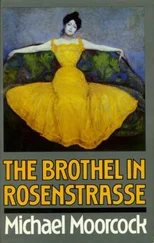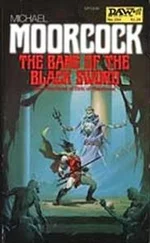Michael Moorcock - Breakfast in the Ruins
Здесь есть возможность читать онлайн «Michael Moorcock - Breakfast in the Ruins» весь текст электронной книги совершенно бесплатно (целиком полную версию без сокращений). В некоторых случаях можно слушать аудио, скачать через торрент в формате fb2 и присутствует краткое содержание. Жанр: Фантастика и фэнтези, на английском языке. Описание произведения, (предисловие) а так же отзывы посетителей доступны на портале библиотеки ЛибКат.
- Название:Breakfast in the Ruins
- Автор:
- Жанр:
- Год:неизвестен
- ISBN:нет данных
- Рейтинг книги:3 / 5. Голосов: 1
-
Избранное:Добавить в избранное
- Отзывы:
-
Ваша оценка:
- 60
- 1
- 2
- 3
- 4
- 5
Breakfast in the Ruins: краткое содержание, описание и аннотация
Предлагаем к чтению аннотацию, описание, краткое содержание или предисловие (зависит от того, что написал сам автор книги «Breakfast in the Ruins»). Если вы не нашли необходимую информацию о книге — напишите в комментариях, мы постараемся отыскать её.
Breakfast in the Ruins — читать онлайн бесплатно полную книгу (весь текст) целиком
Ниже представлен текст книги, разбитый по страницам. Система сохранения места последней прочитанной страницы, позволяет с удобством читать онлайн бесплатно книгу «Breakfast in the Ruins», без необходимости каждый раз заново искать на чём Вы остановились. Поставьте закладку, и сможете в любой момент перейти на страницу, на которой закончили чтение.
Интервал:
Закладка:
On the curve, Karl could see the front section of the train where Nestor Makhno himself sat. The flat-wagons on both sides of him were piled with gun-carriages, their dirty steel and brass work shining dully beneath a sun which now only made occasional appearances through the looming clouds. A truck near to the engine was full of shaggy horses, their backs covered by Jewish prayer-shawls in place of blankets. Makhno's chosen Heroes sat all around their leader, their feet dangling over the sides of the wagons, but none sat near him. Karl had an impression of nothing but legs. There were legs in riding boots, legs in puttees made from silk dresses or red plush or green baize ripped from a billiard table, feet in yellow silk slippers with velvet pompoms bouncing on them, in felt shoes, in laced boots, in sandals and in brogues, or some completely naked, scratched, red, horny, dirty. No songs came from Makhno's guard. They were probably all too drunk to sing.
On Makhno's wagon a huge, gleaming black landau had been anchored. The landau's door was decorated with the gilded coat of arms of some dead aristocrat. The upholstery was a rich crimson morocco leather. The shafts of the landau stuck up into the air and on each shaft flapped a black banner of Anarchy. On each corner of the wagon was placed a highly-polished machine gun and at each machine gun squatted a man in a white Cossack cap and a black leather greatcoat. These four were not drunk. Makhno himself was probably not drunk. He lay against the leather cushions of the landau and laughed to himself, tossing a revolver high into the air and catching it again, his feet in their shining black boots crossed indolently on the coach box. Nestor Makhno was dying. Karl realized it suddenly. The man was small and sickly. His face was the grey face of death. The black Cossack hat and the gay, embroidered Cossack jacket he wore only served to emphasize the pallor of his features. Over his forehead hung a damp fringe of hair which made him look a little like some pictures of Napoleon. And his eyes were alive. Even from where he sat Karl could see the eyes—blazing with a wild and malevolent misery.
Nestor Makhno tossed the revolver up again and caught it. He tossed it and caught it again.
Karl saw that they were nearing a station. The train howled.
The platform was deserted. If there were passengers waiting for a train, they were hiding. People normally hid when Makhno's army came through. Karl grinned to himself. This was not an age in which the timid could survive.
The train slowed as it approached the station. Did Makhno intend to stop for some reason?
And then, incongruously, a guard appeared on the platform. He was dressed in the uniform of the railway line and he held a green flag in his right hand. What a fool he was, thought Karl, still sticking to the rule book while the world was being destroyed around him.
The guard raised his left hand to his head in a shaky salute. There was a terrified grin on his face, an imploring, placatory grin.
The front part of the train was by now passing through the station. Karl saw Nestor Makhno catch his revolver and cock it. Then, casually, as his landau came level with the guard, Makhno fired. He did not even bother to aim. He had hardly glanced at the guard. Perhaps he had not really intended to hit the man. But the guard fell, stumbling backwards on buckling legs and then crumpling against the wall of his office, his whole body shuddering as he dropped his flag and grasped at his neck. His chest heaved and blood vomited from between his lips.
Karl laughed. He swung his machine-gun round and jerked the trigger. The gun began to sing. The bullets smashed into the walls and made the body of the guard dance for a few seconds. Karl saw that the placatory smile was still on the dead man's face. He pulled the trigger again and raked the whole station as they went through. Glass smashed, a sign fell down, someone screamed.
The name of the station was Pomoshnaya.
Karl turned to the fat Georgian who had opened a fresh bottle of vodka and was drinking from it in great gulps. He had hardly noticed Karl's action. Karl tapped him on the shoulder.
"Hey, old Pyat—where the hell is Pomoshnaya?"
The Georgian shrugged and offered Karl the bottle. He was too fuddled to understand the question.
The station was disappearing behind them. Soon it had vanished.
The tattooed sailor, his arm around a snub-nosed girl with cropped hair, a Mauser in her hand, took the bottle from the Georgian and placed it against the girl's thin lips. "Drink up," he said. He peered at Karl. "What was that, youngster?"
Karl tried to repeat his question, but the train entered a tunnel and thick smoke filled their lungs, stung their eyes and they could see nothing. Everyone began to cough and to curse.
"It doesn't matter," said Karl.
— You're still looking a bit pale, says Karl's friend, fingering his own ebony skin.—Maybe you could do with another bath?
Karl shakes his head.—It'll be hard enough getting this lot off. I've got to leave here sometime, you know. It's going to be embarrassing.
— Only if you let it be. Brazen it out. After all, you're not the only one, are you? Karl giggles. — I bet you say that to all the boys.
You have been told that you have at most a year to live. Would you decide to spend that year: (a) enjoying every possible pleasure?
(b) doing charitable works?
(c) in some quiet retreat, relishing the simpler pleasures of life?
(d) trying to accomplished one big thing that you will be remembered for in times to come?
(e) putting all your resources into finding a cure for the illness you have? or would you simply kill yourself and get the whole thing over with?
10
Hitting the High Spots on W. Fifty-Six: 1929:
Recognition
Trapped at sea in a violent thunder storm, the U.S.S. Akron, largest and finest dirigible airship in the world, crashed off the Barnegat Lightship at 12:30 o'clock this morning with 77 officers and men aboard. Among them was Rear Admiral William A. Moffett, chief of the Bureau of Aeronautics.
Only four of the 77 were known to have been saved at 5 o'clock this morning. At that time the wreckage of the stricken airship was out of sight in the storm and darkness from the German oil tanker Phoebus, which first reported the catastrophe. A northwest wind blowing about 45 miles an hour was blowing the wreckage off shore and made rescue operations doubly difficult.
No hint of the cause of the disaster was contained in the fragmentary and frequently confusing reports received from the Phoebus, but it was considered highly likely that the great airship was struck by lightning.
THE NEW YORK TIMES, April 4, 1933.— You were bound to get depressed after all that excitement, says Karl's friend.—What about some coffee? Or would you rather I sent down for some more champagne?
He grins, making an expansive gesture.
— Name your poison!
Karl sighs and chews at his thumbnail. His eyes are hooded. He won't look at the black man.
— All right, then how can I cheer you up?
— You could fuck off, says Karl.
— Take it easy, Karl.
— You could fuck off.
— What good would that do?
— I didn't know you were interested in doing good.
— Where did you get that idea? Don't you feel more a person now than you felt before you came with me through the door? More real?
— Maybe that's the trouble.
— You don't like reality?
— Yes, maybe that's it.
— Well, that isn't my problem.
— No.
— It's your problem.
— Yes.
— Oh, come on now! You're starting a new life and you can't manage even a tiny smile!
Читать дальшеИнтервал:
Закладка:
Похожие книги на «Breakfast in the Ruins»
Представляем Вашему вниманию похожие книги на «Breakfast in the Ruins» списком для выбора. Мы отобрали схожую по названию и смыслу литературу в надежде предоставить читателям больше вариантов отыскать новые, интересные, ещё непрочитанные произведения.
Обсуждение, отзывы о книге «Breakfast in the Ruins» и просто собственные мнения читателей. Оставьте ваши комментарии, напишите, что Вы думаете о произведении, его смысле или главных героях. Укажите что конкретно понравилось, а что нет, и почему Вы так считаете.








